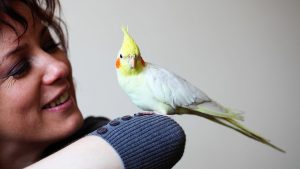Can Pet Birds Cause Asthma? What’s the Link Between Bird Ownership and Respiratory Issues?

I am often asked whether pet birds can cause asthma. As someone who has owned birds for many years and has asthma, I understand the concern.
In this article, I will explore the relationship between pet birds and asthma, including potential health risks and how to recognise and manage asthma symptoms.

Asthma is a chronic respiratory disease that affects millions of people worldwide. Symptoms can range from mild to severe and may include wheezing, coughing, chest tightness, and shortness of breath. While there is no cure for asthma, it can be managed with proper treatment and lifestyle changes. However, some people may be more susceptible to asthma triggers, including pet birds.
Bird keeping is a popular hobby, but it is important to understand the potential health risks associated with it.
Exposure to bird droppings, feathers, and dust can trigger asthma symptoms in some people. Additionally, certain species of birds, such as parrots and cockatiels, are known to carry a bacteria called Chlamydia psittaci, which can cause a respiratory illness called psittacosis.
Understanding Asthma and Pet Birds

As a bird owner, I understand the joy of having a feathered friend in the house. However, it’s essential to be aware of the potential health risks, especially if you or someone in your household has asthma.
In this section, I’ll explain the link between birds and asthma and discuss common asthma triggers in bird owners.
The Link Between Birds and Asthma
Birds are known to produce allergens that can trigger asthma symptoms in susceptible individuals. These allergens are found in bird dander, feathers, droppings, and saliva.
When these allergens are inhaled, they can cause the airways to become inflamed and narrow, leading to asthma symptoms such as wheezing, coughing, chest tightness, and shortness of breath.
Research has shown that exposure to bird allergens can cause asthma symptoms in bird owners, particularly those who spend a lot of time around their feathered friends. In some cases, exposure to bird allergens can even lead to the development of asthma in previously healthy individuals.
Common Asthma Triggers in Bird Owners
If you or someone in your household has asthma, it’s essential to be aware of the common asthma triggers in bird owners. These include:
- Bird dander: Small flakes of dead skin shed by birds that can trigger asthma symptoms when inhaled.
- Bird feathers: Feathers can release allergens into the air, triggering asthma symptoms.
- Bird droppings: Bird droppings can contain allergens that can trigger asthma symptoms when inhaled.
- Cleaning products: Many bird owners use cleaning products that can irritate the airways and trigger asthma symptoms.
To reduce the risk of asthma symptoms, bird owners should take steps to minimize exposure to these triggers. This can include:
- Keeping the bird in a separate room with good ventilation.
- Using an air purifier with a HEPA filter to remove allergens from the air.
- Regularly cleaning the bird’s cage and surrounding areas to remove bird droppings and feathers.
- Using cleaning products that are safe for use around birds and do not contain harsh chemicals.
What Are the Potential Health Risks of Bird Keeping? https://www.youtube.com/embed/HsRD2RMzBOU
As a bird owner, I understand the joy and companionship that these feathered friends can bring. However, it is important to be aware of the potential health risks associated with bird keeping. In this section, I will discuss some of the most common health risks that come with owning a pet bird.
Allergic Reactions to Bird Proteins
Birds produce a protein called “bird dust” that can cause allergic reactions in some people. This protein is found in bird feathers, droppings, and dander.
Symptoms of an allergic reaction to bird dust can include sneezing, coughing, wheezing, and skin rashes. In severe cases, it can cause anaphylaxis, a life-threatening allergic reaction.
Respiratory Illnesses from Birds
Birds can also carry bacteria, viruses, and fungi that can cause respiratory illnesses in humans. One of the most common respiratory illnesses associated with bird keeping is called “bird fancier’s lung.”
This condition is caused by inhaling dust from bird feathers, droppings, and dander. Symptoms of bird fancier’s lung can include coughing, shortness of breath, and chest tightness.
Psittacosis and Other Bird-Related Diseases
Birds can also carry diseases that can be transmitted to humans. One of the most well-known bird-related diseases is psittacosis, also known as parrot fever.
This disease is caused by a bacteria called Chlamydia psittaci, which is commonly found in birds. Symptoms of psittacosis can include fever, chills, headache, muscle aches, and a dry cough.
Other bird-related diseases include aspergillosis, which is caused by a fungus found in bird droppings and can cause respiratory illness, and avian influenza, which is a viral infection that can be transmitted from birds to humans.
How to Recognise and Manage Asthma Symptoms https://www.youtube.com/embed/EScptTHQPuw
Identifying Early Signs of Asthma
As a pet bird owner, it’s important to know the early signs of asthma. Asthma symptoms can vary from person to person, but some common signs include coughing, difficulty breathing, shortness of breath, and wheezing.
These symptoms can be triggered by various factors, including allergies, exercise, and stress.
If you notice any of these symptoms, it’s important to seek medical attention right away. Your doctor can help you determine if you have asthma and develop a treatment plan to manage your symptoms.
Treatment Options for Asthma
There are several treatment options available for asthma, including medications and lifestyle changes.
Your doctor may prescribe medications such as inhalers or oral medications to help manage your symptoms.
It’s important to follow your doctor’s instructions carefully and take your medications as prescribed.
In addition to medications, there are several lifestyle changes you can make to help manage your asthma symptoms. These include:
- Avoiding triggers such as pet dander, dust, and smoke
- Maintaining a healthy weight
- Exercising regularly
It’s also important to have a plan in place for managing asthma attacks. This may include carrying a rescue inhaler with you at all times and knowing when to seek emergency medical attention.
Creating a Safe Environment for Asthma Patients with Birds

As a bird owner with asthma, I understand the importance of creating a safe environment for myself and my pets. Here are some tips to help improve air quality at home and maintain a healthy living space for both you and your feathered friends.
Improving Air Quality at Home
Improving air quality at home is essential for asthma patients with birds. Here are some simple steps you can take to improve the air quality in your home:
- Use an air filter: An air filter can help remove allergens and pollutants from the air. Make sure to choose a filter that is designed for removing pet dander and other allergens.
- Proper ventilation: Proper ventilation is important for maintaining good air quality. Open windows and doors to allow fresh air to circulate in your home.
- Air circulation: Air circulation is important for removing stale air and pollutants. Use fans or install an air circulation system to help improve air quality in your home.
Best Practices for Bird Cage Maintenance
Maintaining a clean and healthy bird cage is essential for keeping your pets healthy and reducing the risk of asthma attacks. Here are some best practices for bird cage maintenance:
- Clean the cage regularly: Regular cleaning is important for maintaining a healthy living space for your birds. Clean the cage at least once a week, and more often if necessary.
- Use safe cleaning products: Use safe and non-toxic cleaning products to avoid exposing your birds to harmful chemicals.
- Keep the cage in a well-ventilated area: Keeping the cage in a well-ventilated area can help reduce the risk of respiratory problems for both you and your pets.
When to Seek Medical Advice https://www.youtube.com/embed/jJm3ga7N3Es
As a pet bird owner, it is important to monitor your health and the health of your bird regularly. However, if you experience any signs of illness or severe allergic reactions, seeking medical attention is crucial.
Signs of Severe Allergic Reactions
Allergic reactions to pet birds can range from mild to severe. Symptoms may include sneezing, coughing, and nasal congestion.
In some cases, pet bird allergies can lead to more severe reactions such as difficulty breathing, chest tightness, and wheezing.
If you experience any of these symptoms, it is important to seek medical attention immediately. Anaphylaxis is a severe allergic reaction that can be life-threatening, and prompt medical attention is necessary to prevent serious complications.
Monitoring Health Changes in Birds and Owners
As a pet bird owner, it is important to monitor your bird’s health as well as your own. Changes in behavior or health can be early signs of illness.
If you notice any changes in your bird’s behavior or health, consult your veterinarian immediately.
Additionally, if you experience any health changes such as coughing, wheezing, or shortness of breath, it is important to seek medical attention. Your physician can help determine if your symptoms are related to your pet bird and provide appropriate treatment.
Frequently Asked Questions

What are the common symptoms of bird allergies in humans?
Bird allergies can cause a range of symptoms. These include sneezing, coughing, runny nose, itchy eyes, and skin rashes. In some cases, bird allergens can also trigger asthma symptoms such as wheezing, shortness of breath, and chest tightness.
How can I tell if I’m having an allergic reaction to my pet bird?
If you suspect that you may be allergic to your pet bird, pay attention to any symptoms that arise after you handle or spend time around your bird. Common signs of a bird allergy include sneezing, coughing, runny nose, itchy eyes, and skin rashes. If you experience any of these symptoms, speak with your doctor for an accurate diagnosis.
What treatments are available for those allergic to birds?
Several treatment options are available for people who are allergic to birds. Over-the-counter antihistamines and nasal sprays can help relieve mild allergy symptoms. Meanwhile, prescription medications may be necessary for more severe cases. In some cases, doctors may also recommend allergy shots (immunotherapy) to help desensitize the immune system to bird allergens.
Is it true that bird dander can exacerbate asthma symptoms?
Yes, exposure to bird dander can trigger asthma symptoms in some people. Bird allergens can cause inflammation in the airways, leading to wheezing, shortness of breath, and chest tightness. If you have asthma and are allergic to birds, take steps to minimize your exposure to bird allergens.
How often do pet birds cause allergic reactions in their owners?
The frequency of pet bird allergies varies from person to person. Some people may be highly sensitive to bird allergens and experience symptoms with minimal exposure, while others may have no allergic reaction at all. If you’re considering getting a pet bird, spend some time around birds beforehand to see how your body reacts.
What should I do if I develop a rash after handling my pet bird?
If you develop a rash after handling your pet bird, wash the affected area with soap and water. Then, apply a topical corticosteroid cream to help reduce inflammation.
If the rash persists or becomes more severe, contact your doctor for further evaluation and treatment options.











